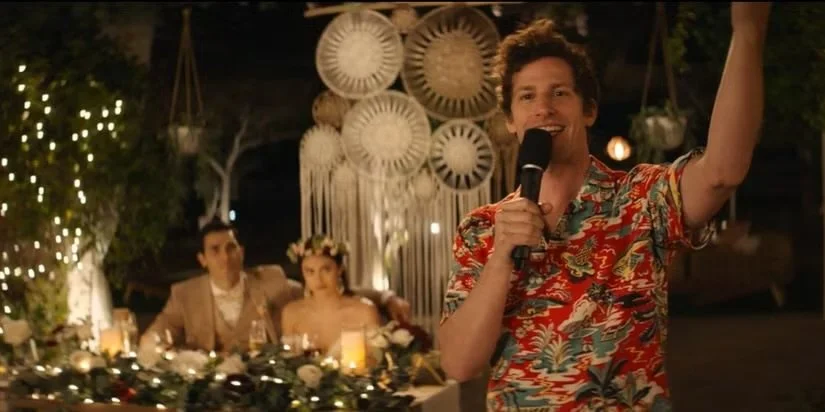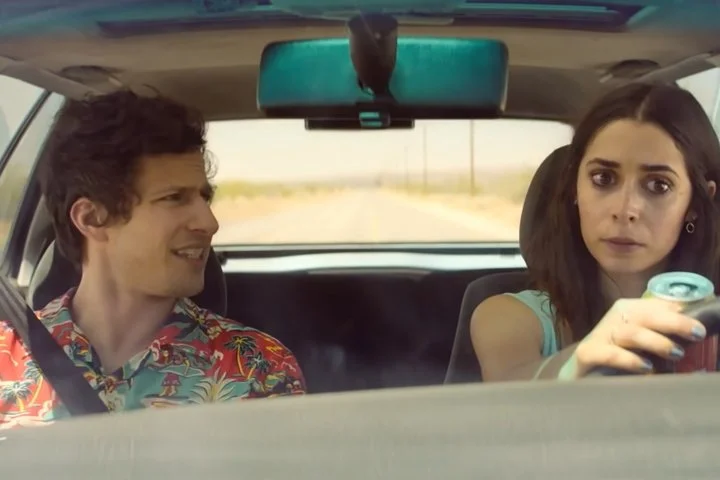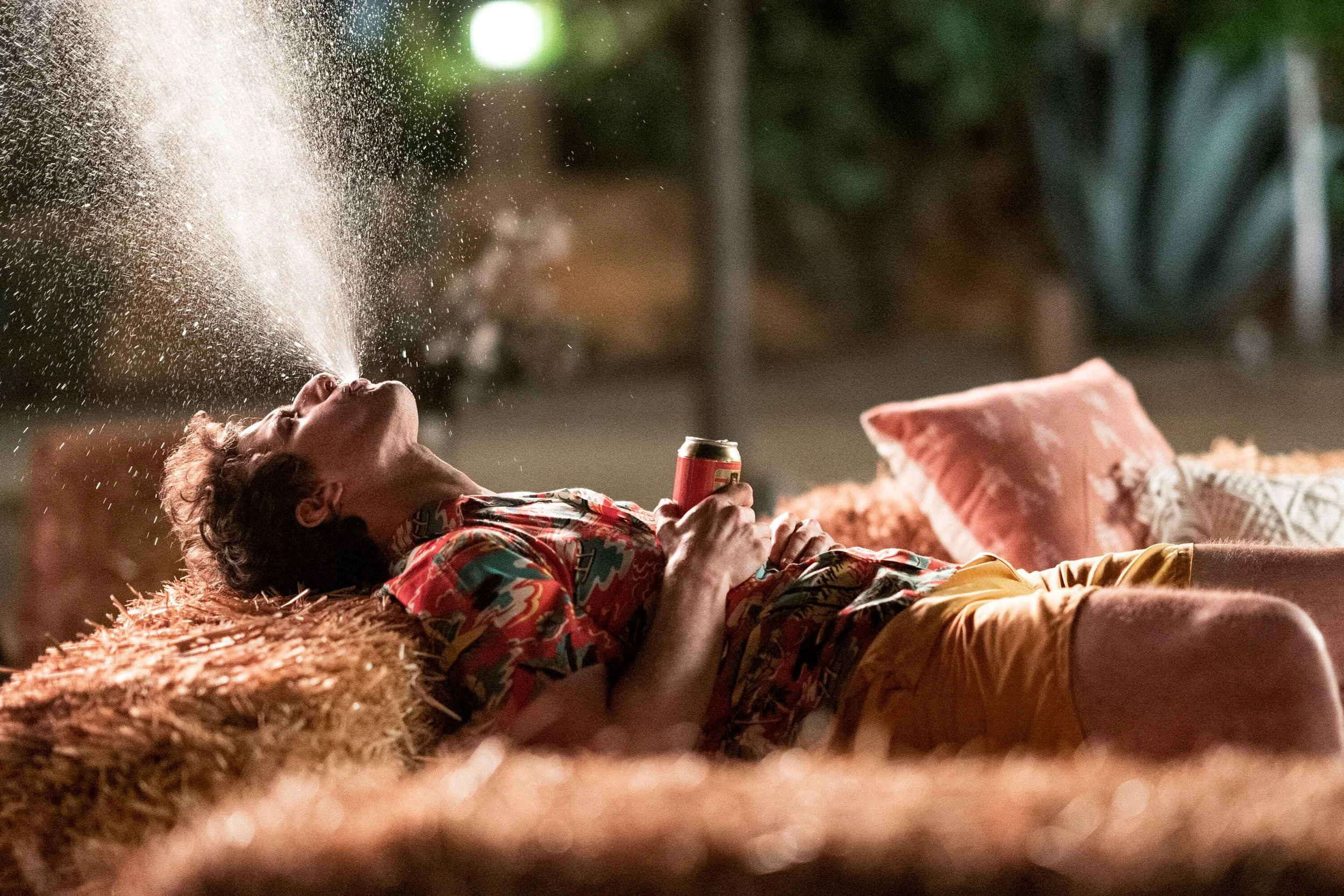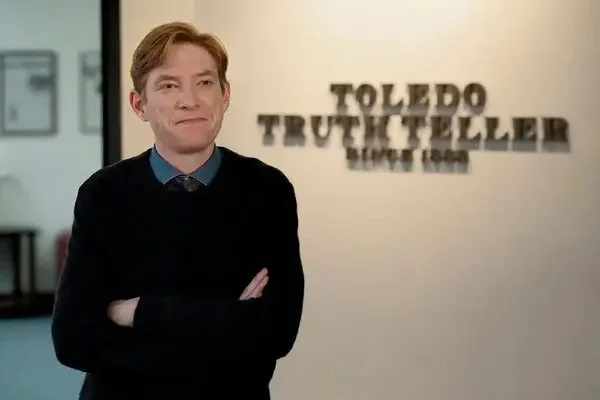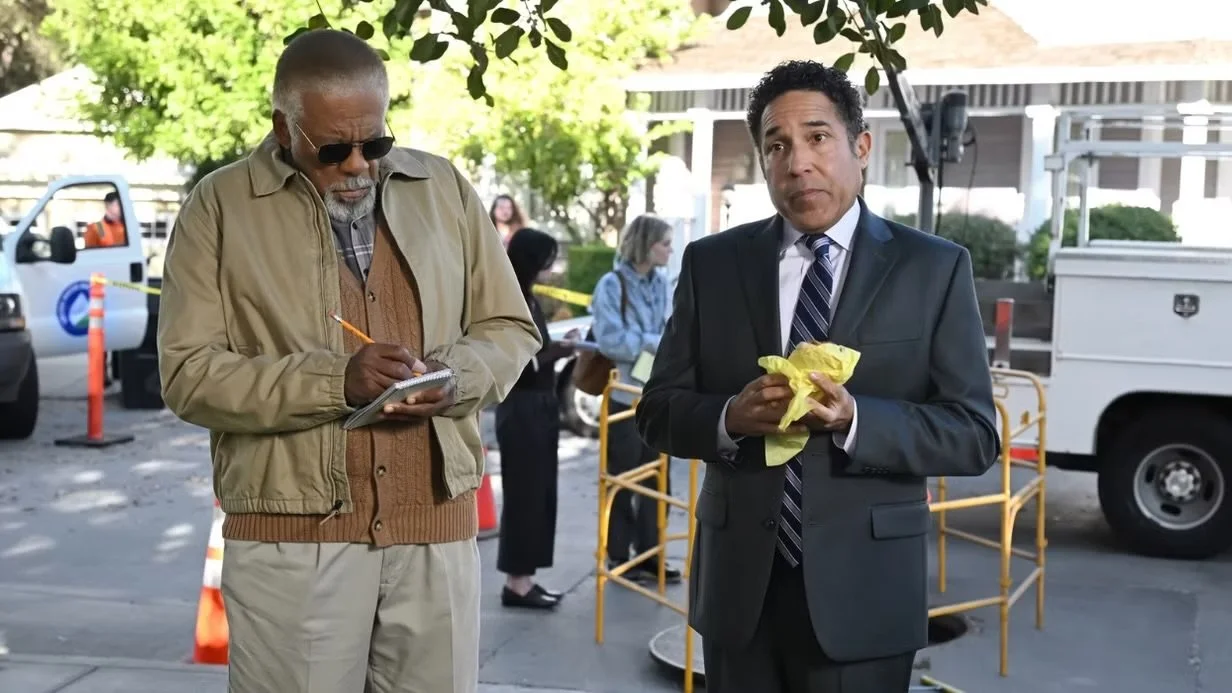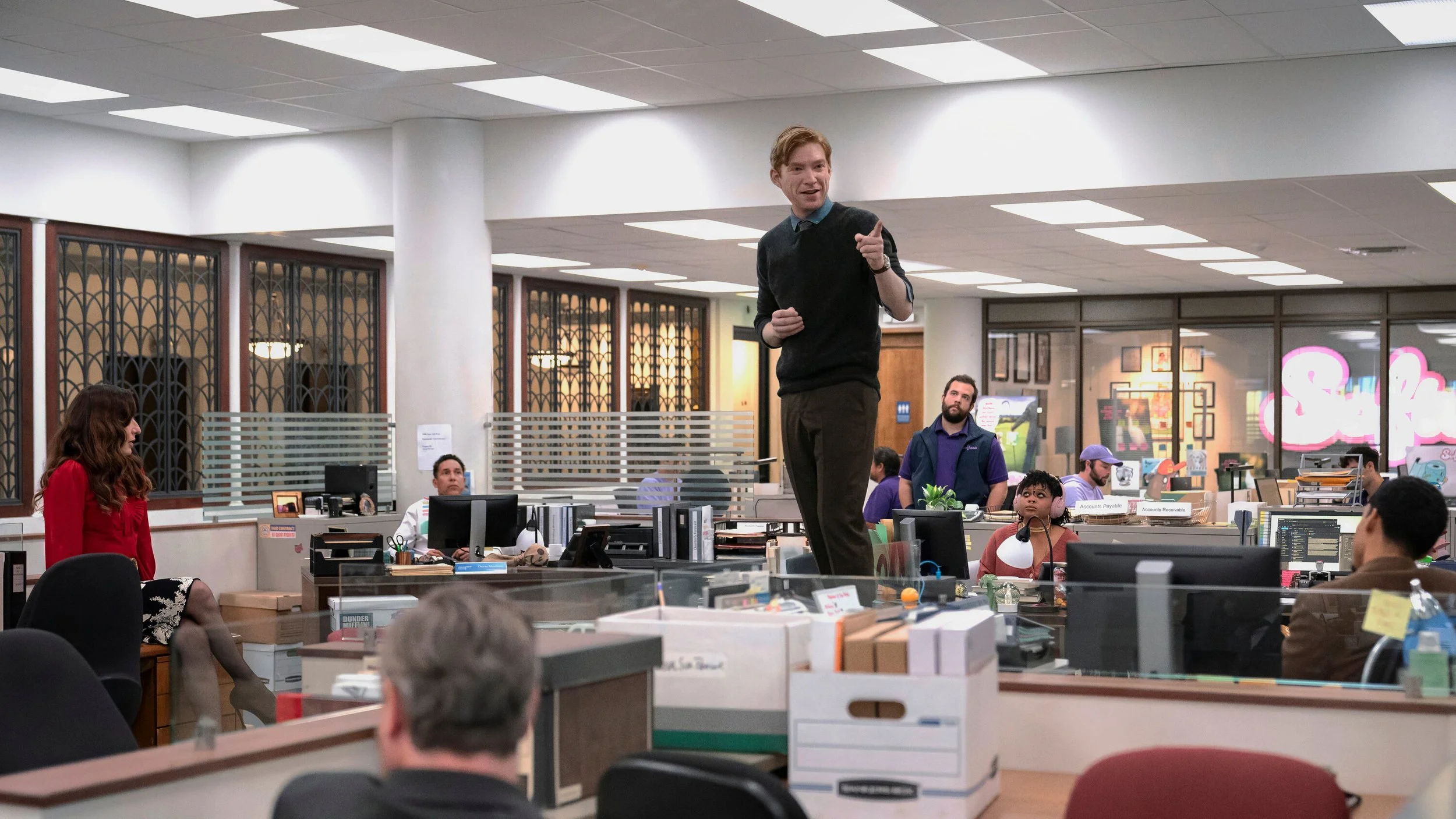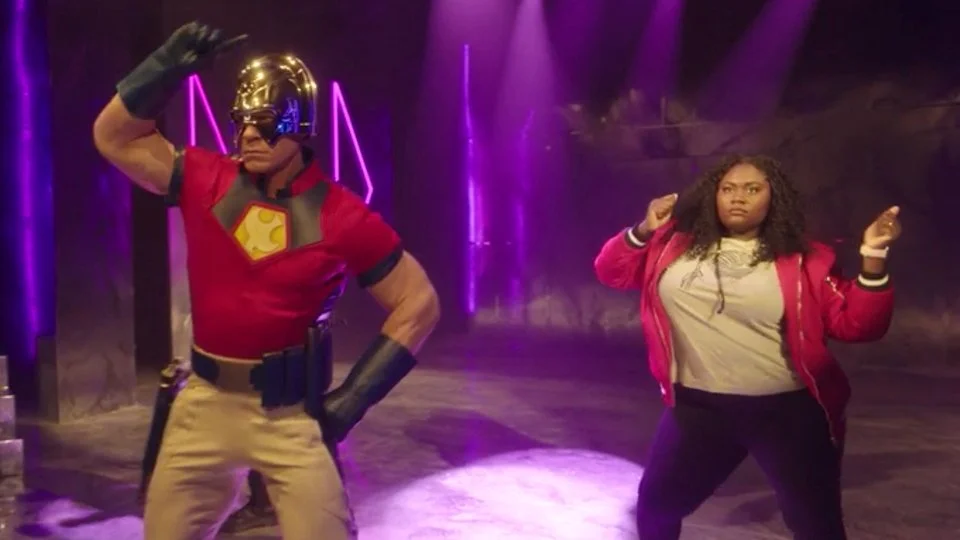Weddings can be hard to deal with sometimes. Whether you’re in a relationship or not, big life events tend to bring up feelings in people. They make you take stock. Milestones make people reflect and reflecting can be difficult. So when family screw-up Sarah arrives at her perfect sister’s wedding, she is kind of overwhelmed by the situation. Until she meets Nyles, that is, the only person at the wedding in a Hawaiian shirt and swim trunks. He spends his day drinking and lounging in the pool, nihilistic as ever, declaring that everyday is the same and life is meaningless (I mean, I’ve been to weddings, I get it). Nyles bails her out of a sticky situation by giving a truly moving, romantic, and hopeful speech in her stead, and then dances through the crowds of guests undulating to the music, floating across the floor with a surprising level of grace for a man that drunk. It felt like his toast was written just for Sarah and then he caught her eye when gliding through the reception like a carefree ghost that only she can see, in a scene of great visual humor. His deft movements and nonchalant attitude lead to a frankness that Sarah finds intriguing. He even admits to not believing a word of his crowd-pleasing toast.
Nyles, played by Andy Samberg (Brooklyn 99, Popstar: Never Stop Never Stopping) isn’t a close friend of the family, but his girlfriend Misty, played by Meredith Hagner (Search Party, Bad Monkey), is one of the bridesmaids. They’re a bit on the rocks, the two of them, but he’s at the wedding anyway. Sarah, played by Cristin Milioti (The Penguin, Fargo), follows him to the window outside where Misty is cheating on him with another member of the wedding party. The two of them then sneak off into the desert of Palm Springs to get drunk together and probably make some bad decisions. However, this is interrupted when Nyles, full on in the middle of the wooing process, gets an arrow to the shoulder and yells out into the night air to a man called Roy. They say most people know their attackers, but to know it even when taking a silently fired arrow in the back? That’s on another level. Nyles retreats to a cave, a spot he knows well, and hides as the desert sand bathes in an otherworldly glow emanating from the cave. Roy, unable to find Nyles this time, makes his way into the cave and disappears. Nyles, now feeling the effects of his archery-related injuries, drags himself towards the glow as Sarah appears trying to be of help. Nyles implores her to just go away and to not follow him into the cave, but she’s dragged in anyway. And when she wakes up the next morning, it’s this morning. Nyles has been in it for a while, but, oh no, this is Sarah’s first loop. And she’s not too happy about it. Weddings, right? The cake is always disappointing and then you get stuck in a time loop.
And thus begins Palm Springs, a brilliant take on the done-to-death time loop film. The Hulu original hit the streamer in 2020 in a strange coincidence; while Hollywood was figuring out how to keep going when we weren’t supposed to get within six feet of each other, writer/director Max Barbakow delivered the perfect quarantine film almost by accident. While much of the world was shut tight in their homes trying to survive a global pandemic and repeating the day over and over again, what could be easier to relate to than a man stuck at a wedding with his cheating girlfriend and a bunch of people who don’t know him, repeating the day like a video game level that you just can’t beat? By the time we meet Nyles, he’s been in the loop so long that yesterday, today, and tomorrow are not just literally indistinguishable from each other because time stopped moving forward, his memory of everything that’s happened has blurred together. Just like we were, he was stuck in place with what felt like no way out. And despite it being an awful realization for her, like Daffy Duck realizing he’s standing in quicksand, Sarah getting stuck in there with him is probably the best thing that’s happened to Nyles for a long, long while. After all, the only other person stuck in there with him was Roy (played by the legendary JK Simmons), who is trying to kill him. And often succeeding, because all it takes for the loop to start over is to fall asleep or die and Roy seems to get really creative with how he goes after Nyles.
Palm Springs pulls off a neat trick here, something that you rarely see in time loop movies. The gold standard is Groundhog Day, of course, and most movies follow that model of having one person stuck in the loop. But here, not only are there more than one person in the loop, they’ve all been there for different lengths of time. It allows the film to skip over the specifics of the loop that it doesn’t feel like taking the time to go through and focus on the differing stages of being stuck. Nyles knows the rules well enough, or rather, simply doesn’t care much about anything anymore, accepting his fate. Anything the film isn’t interested in explaining is brought up and waved away, so you can zip through the extraneous trappings of science fiction. What follows then is an interesting exploration of a life free of consequences. Everything that happens with that day just resets. We get an incredible montage of Nyles and Sarah’s exploits together. This section of the movie really packs in the laughs per minute, as their antics ramp up over the course of many loops. The first act is very funny as well, but the second act gives you just so much pure comedy that if you look away you’ll miss something. But the movie does stop and take a breather now and then, as you get to see these two people try to figure out what their new life is. In addition to shooting a cake with a crossbow, they also take time to ask some philosophical questions about their predicament; if there is no forward progression in life and none of your actions have consequences, then is life meaningless? Nyles answers with an emphatic yes; the kind of answer that comes with the resignation of having spent too much time suffering a Sisyphean punishment for reasons unknown. Being doomed to live the same day over and over again can’t be great for the psyche. But as that montage showed, even being stuck in hell can have its upsides if you’re stuck in it with the right person.
While the first two acts are mostly fun and games, the third act takes a more serious and dramatic turn; I’ve said many times before that I feel like comedy, when done at the highest level, is visual literature and I think Palm Springs reaches that level. Nyles and Sarah start asking very relatable questions about the human condition and that’s what elevates this over other more run-of-the-mill comedies. A good laugh is great, but if you can get a good laugh and feel something, that’s even better and that’s exactly what Palm Springs delivers. Loneliness plagues us in our modern life and then urges us to put up even more walls, cementing ourselves into our loneliness in the name of protection. But indiscriminate openness isn’t a viable option either; people need to protect themselves. I don’t know if you’ve noticed, but it’s not the best world out there and being that open leaves yourself exposed, vulnerable to dangers physical, emotional, and mental. Opening up is hard and sometimes it does take being stuck in a situation with someone to let the walls down a little and try to make a genuine connection with a person. Life is meant to be shared, but finding the right people to share it with is hard. I don’t have an answer for you, though I wish I did. I’m a member of this so-called modern society as well (though with how we behave towards one another, I question this idea that we deserve to be called modern and sometimes I feel like society is a stretch) and I’m going through it just the same as anyone else, including Nyles and Sarah.
Andy Samberg really shows off his range here—I always love it when comedians and comic actors get serious because they’re just so damn good at it. Like Will Ferrell in Stranger Than Fiction and Everything Must Go or Jim Carrey in The Truman Show, Samberg kills it as the nihilistic Nyles, handling both the comedy and drama with equal aplomb. And it should come as no surprise that I will be full of praise for Cristin Milioti, just as I was for her performance in The Penguin and just about everything else I’ve ever seen her in. The Emmy nominated actress can’t stop showing off how good she is at this acting thing; she is so expressive in every frame and feels incredibly real in every moment of the film. Part of that is the writing, of course; Sarah is a fully realized and complicated character, with flaws and nuance, not just the romantic interest for Nyles. But Milioti’s acting ability sells Sarah every second she’s on screen and I can’t praise her enough. She’s probably the most underrated actress out there today and I won’t stop talking about it until she’s recognized as the best in the biz. And the chemistry between the two is at the heart of this film. It’s so strong that the actors disappear into the characters and the world is immediately believable and real to you; and it’s no small feat to make Jake Peralta disappear into another character, that’s for sure. Milioti was predictably excellent because she always is, but it’s Samberg who is truly a surprise and I really hope to see more roles like this from him in the future.
There is something truly beautiful about Palm Springs. The movie manages to pack in a lot of comedy and reality into its 90 minute runtime without ever feeling rushed or overstuffed. It’s a celebration of all of life’s foibles and troubles and the things that make them worth it. It’s a joyful, optimistic film about meaning in life being found through our connections with others. What felt like the perfect movie for the moment it was released turned out to be a great movie for any time. This is only the second time I’ve seen it and I admit to a small amount of hesitation to watch it again. I was worried that outside of that moment it wouldn’t hold up, but I am so glad that I have been proven wrong. While pure coincidence means that Palm Springs captures the feeling of being quarantined during the COVID pandemic flawlessly, its quality in writing, acting, and direction mean that it remains a great film regardless. Streaming on Hulu with an RT score of 94% and an audience score of 89%, I highly recommend taking the hour and a half to check it out. I doubt you’ll be disappointed.
Since you made it this far, it’s time for a little housekeeping. Palm Springs marks the end of summer and now we’re getting into spooky season. So starting with the next post, we’re getting into spooky media. I’ve got an ambitious plan for October, so let’s see if I can pull it off together. As always, thanks for reading!

